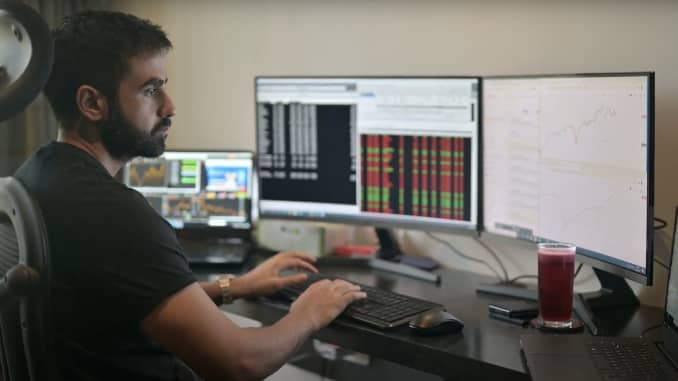MILLENIAL CAPITALI$M
How this 34-year-old chess champion became India’s youngest new billionaire
LONG READ
Published Tue, Jan 12 2021
Karen Gilchrist
This 34-year-old chess champion is India’s youngest new billionaire
Netflix’s “The Queen’s Gambit” may have popularized chess for modern audiences, but Nikhil Kamath liked the game way before it was cool.
So much so, that he dropped out of high school at 14 to play full time.
“Chess teaches you how to work under a structure, in a system, but yet try and be creative within that system,” Kamath told CNBC Make It.
That was the starting move in a sequence of events that would eventually earn him billionaire status as part of India’s answer to trading platform Robinhood.
The opening move
Thirty-four-year-old Kamath is the co-founder and chief investment officer of Zerodha, India’s largest trading brokerage.
Today, more than 15% of India’s retail trades are done through its platform, as ordinary investors flocked to stocks during the pandemic.
But when the school dropout began trading at 17 years old, that wasn’t the strategy: Having played chess internationally but fallen short of a professional career, he simply needed a backup plan. Inspired by his elder brother, Nithin, he took to stock trading, and taught himself on the go.
“No one was going to hire me without a college degree, which meant I had to do something which didn’t require one,” said Kamath.

Nikhil Kamath, co-founder and chief investment officer at
Playing the markets
In 2010, Zerodha — a combination of “zero” and “rodha,” the Sanskrit word for barriers — was born.
Today, unlike most start-ups, the company hasn’t taken on any external investment.
“We’ve been different in a way from other companies as in, we’ve never taken on investors or debt or never really raised any capital. Our ethos from the very beginning was build a better product and word of mouth will bring the clientele to you,” he said.
In the decade since, Zerodha has grown through word of mouth as the appetite for investments beyond gold and property has grown in India. But in 2020, all that changed during the pandemic. At the height of lockdowns, the company doubled its registered users to more than 4 million.
“The pandemic has been good to us, which is a strange thing to say. People had a lot more time, people were at home and, unfortunately, in many cases, they were in a position where an alternate income could have been very useful,” he said.

Phone displaying the app interface of Indian trading platform Zerodha.
Zerodha
Shailesh Lakhani, managing director at venture capital firm Sequoia India, said that demonstrates how the pandemic has accelerated the already growing demand for investing in the country.
“It’s driven by a few different factors. One, that it’s just become a lot easier with the financial services infrastructure to open a brokerage account,” Lakhani told CNBC Make It.
“Second, mutual funds in the past several years have tended to underperform the equity indices or their benchmarks. And as we’ve had rising markets aside from the coronavirus — that fear in March, April, May — the markets have been pretty easy to make money in for a lot of folks.”
Beating the competition
In 2020, the average age of an investor using the Zerodha platform fell from 32 to 30 years old. That has drawn parallels with U.S. trading platform Robinhood, which experienced a similar surge in millennials during the pandemic.
“We started, actually, maybe five years before they did,” Kamath pointed out.
However, that growing market could pave the way for a future expansion into the U.S., he added.
“We would look at approaching their market at some point and seeing if there are ways in which our products can integrate with what is available in America,” he said.
Even as the financial technology space gets increasingly competitive, Kamath says Zerodha has no plans to raise more capital, unlike its competitor Robinhood. That hasn’t prevented talk of the entrepreneur’s growing fortune, though.
In October 2020, the Kamath brothers joined Forbes India Rich List with a combined wealth of $1.55 billion, as 34-year-old Nikhil was named India’s youngest new billionaire.
“For a while now, I don’t think financial motives have been the focus. I don’t think it’s the most important thing and that’s set to continue,” said Kamath. “But I think more access to capital gives you the room and the courage to.
Karen Gilchrist
This 34-year-old chess champion is India’s youngest new billionaire
Netflix’s “The Queen’s Gambit” may have popularized chess for modern audiences, but Nikhil Kamath liked the game way before it was cool.
So much so, that he dropped out of high school at 14 to play full time.
“Chess teaches you how to work under a structure, in a system, but yet try and be creative within that system,” Kamath told CNBC Make It.
That was the starting move in a sequence of events that would eventually earn him billionaire status as part of India’s answer to trading platform Robinhood.
The opening move
Thirty-four-year-old Kamath is the co-founder and chief investment officer of Zerodha, India’s largest trading brokerage.
Today, more than 15% of India’s retail trades are done through its platform, as ordinary investors flocked to stocks during the pandemic.
No one was going to hire me without a college degree, which meant I had to do something which didn’t require one.
Nikhil Kamath
CO-FOUNDER AND CHIEF INVESTMENT OFFICER, ZERODHA
But when the school dropout began trading at 17 years old, that wasn’t the strategy: Having played chess internationally but fallen short of a professional career, he simply needed a backup plan. Inspired by his elder brother, Nithin, he took to stock trading, and taught himself on the go.
“No one was going to hire me without a college degree, which meant I had to do something which didn’t require one,” said Kamath.

Nikhil Kamath, co-founder and chief investment officer at
Indian brokerage Zerodha, trades at home.
Zerodha
It went well — and soon, the pair was investing for family and friends. But along the way, they found that the system was too complex.
“The problem back in the day, I’m talking about 11 or 12 years ago, is cost was very high. Brokerage fees were incredibly high in India,” Kamath said. “And for a full-time trader, there were many barricades or barriers one had to cross before he could actually be profitable in any consistent kind of manner.”
So the Bangalore-born brothers set to work, using their savings to build a simple and affordable brokerage platform for everyday investors.
Zerodha
It went well — and soon, the pair was investing for family and friends. But along the way, they found that the system was too complex.
“The problem back in the day, I’m talking about 11 or 12 years ago, is cost was very high. Brokerage fees were incredibly high in India,” Kamath said. “And for a full-time trader, there were many barricades or barriers one had to cross before he could actually be profitable in any consistent kind of manner.”
So the Bangalore-born brothers set to work, using their savings to build a simple and affordable brokerage platform for everyday investors.
Playing the markets
In 2010, Zerodha — a combination of “zero” and “rodha,” the Sanskrit word for barriers — was born.
Today, unlike most start-ups, the company hasn’t taken on any external investment.
“We’ve been different in a way from other companies as in, we’ve never taken on investors or debt or never really raised any capital. Our ethos from the very beginning was build a better product and word of mouth will bring the clientele to you,” he said.
The pandemic has been good to us, which is a strange thing to say.Nikhil KamathCO-FOUNDER AND CHIEF INVESTMENT OFFICER, ZERODHA
In the decade since, Zerodha has grown through word of mouth as the appetite for investments beyond gold and property has grown in India. But in 2020, all that changed during the pandemic. At the height of lockdowns, the company doubled its registered users to more than 4 million.
“The pandemic has been good to us, which is a strange thing to say. People had a lot more time, people were at home and, unfortunately, in many cases, they were in a position where an alternate income could have been very useful,” he said.

Phone displaying the app interface of Indian trading platform Zerodha.
Zerodha
Shailesh Lakhani, managing director at venture capital firm Sequoia India, said that demonstrates how the pandemic has accelerated the already growing demand for investing in the country.
“It’s driven by a few different factors. One, that it’s just become a lot easier with the financial services infrastructure to open a brokerage account,” Lakhani told CNBC Make It.
“Second, mutual funds in the past several years have tended to underperform the equity indices or their benchmarks. And as we’ve had rising markets aside from the coronavirus — that fear in March, April, May — the markets have been pretty easy to make money in for a lot of folks.”
Beating the competition
In 2020, the average age of an investor using the Zerodha platform fell from 32 to 30 years old. That has drawn parallels with U.S. trading platform Robinhood, which experienced a similar surge in millennials during the pandemic.
“We started, actually, maybe five years before they did,” Kamath pointed out.
However, that growing market could pave the way for a future expansion into the U.S., he added.
We would look at approaching their market at some point.Nikhil KamathCO-FOUNDER AND CHIEF INVESTMENT OFFICER, ZERODHA
“We would look at approaching their market at some point and seeing if there are ways in which our products can integrate with what is available in America,” he said.
Even as the financial technology space gets increasingly competitive, Kamath says Zerodha has no plans to raise more capital, unlike its competitor Robinhood. That hasn’t prevented talk of the entrepreneur’s growing fortune, though.
In October 2020, the Kamath brothers joined Forbes India Rich List with a combined wealth of $1.55 billion, as 34-year-old Nikhil was named India’s youngest new billionaire.
“For a while now, I don’t think financial motives have been the focus. I don’t think it’s the most important thing and that’s set to continue,” said Kamath. “But I think more access to capital gives you the room and the courage to.
READ ON
No comments:
Post a Comment